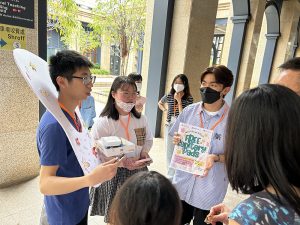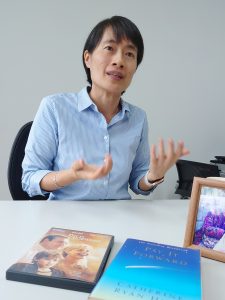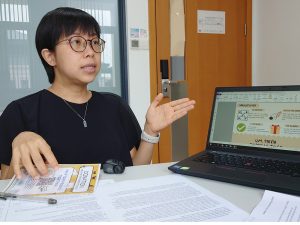Project-based learning is an academic English course offered by the English Language Centre (ELC) at the University of Macau (UM). The course guides students to apply English skills in real-life scenarios in which they plan community service activities. Past activities included a flea market for sales of second-hand items to promote sustainable development and free English translation services for people in need. The activities encourage students to help others without expecting anything in return, to ‘Pay It Forward’ on campus and beyond.
Project-based learning
At a flea market on the UM Student Activity Centre plaza, students sold second-hand items that were no longer used but still had value at reasonable prices to those in need. This initiative ensured that useful items were not wasted. The idea for the market came from a project proposal in an ELC academic English course. By participating in the project, students not only gained valuable practical experience, but also promoted sustainable development.
The flea market idea was proposed by a student group enrolled in the Project-based Learning course, and led by Amy Hong, a first-year student in the Department of History and Lui Che Woo College. The group persuaded the UM staff and students who attended their open presentation to vote in support of the proposal and put their environmental ideas into action. By facilitating project-based learning, this academic English course encourages students to apply English skills in their projects. Exemplifying the project theme ‘Pay It Forward’, students in the course collect data and write project proposals. They also showcase their ideas in open presentations, execute their plans, and promote the activities. These activities allow students to apply the language and communication skills they learn in the classroom.
Hong and her classmates organised the flea market with the theme of loving the earth and promoting sustainable development. She believes it is important to identify the need for a service before planning a project. To this end, they conducted thorough research, including literature reviews and surveys administered to students from different years and majors about their preferences for sharing old items, and this aligned the activity with actual student needs. Due to the heavy workload of organising the event, Hong and her classmates required the assistance of students from other groups. Zhang Muan, a first-year student in the Department of Government and Public Administration and Cheong Kun Lun College, later joined the flea market team because of their environmental mindset, and he worked with them to execute the project. He says that the process was very enjoyable and he has been able to communicate his ideas effectively in public settings using the academic English skills from the course.
Solving real-world problems effectively
Project-based Learning is a level 4 course in the ELC curriculum and advanced English proficiency is a prerequisite. The course integrates academic writing, public speaking, and experiential learning, with the objective of enhancing students’ comprehensive practical English skills through rigorous training. In the current semester, four sections were offered and taught by ELC senior instructors Alice Lee and Miranda Ma. Inspired by Catherine Ryan Hyde’s novel Pay It Forward, the instructors advocate instilling in students the spirit of helping others while teaching English, and they put this idea into practice in the course design. After a semester of preparation, the students launched a week-long event with various activities, including the flea market, Period Pride (an activity designed to promote a healthy mindset concerning menstruation ), an umbrella sharing service, a multicultural handicraft workshop, and optimised laundry services in residential colleges.
Lee and Ma observed that regardless of the type or format of the activities they conducted, students needed to communicate and collaborate with one another, and they had to apply critical thinking, writing, and public speaking skills to solve real-world problems. ‘When carrying out their plan in real-life scenarios, they have to convince different audiences and deal with various situations, such as lobbying their teachers and fellow students for their support, or promoting their event over social media. How can they express themselves accurately and eloquently in these rhetorical situations? These are the basic learning objectives we set for our students in this course,’ says Lee.
Spreading love outside the campus
The Project-based Learning course encourages students to apply their knowledge to serve the community. Some former students in the course developed community service projects to spread love to others. In early 2022, Koni Lau, a third-year student of English studies in the Faculty of Arts and Humanities, together with her classmates, noticed that the government’s guidelines on epidemic prevention measures were published in Chinese, Portuguese, and English. They wondered how foreign workers who were not familiar with these languages could keep abreast of the latest news about the epidemic. Therefore, they visited communities with a high number of migrant workers and interviewed them to document the language barriers they encountered in their daily lives.
As this community service project involved extensive translation work, the team led by Lau began recruiting volunteers on campus to translate government information for migrant works.
‘Among us, there were students who understand Vietnamese, Indonesian, or Filipino languages. After realising that many migrant workers required translation support, we translated the government’s information from English into these languages and emailed the information to migrant worker groups in Macao. This way migrant workers could stay updated on epidemic prevention policies, and they were very grateful for our help. Through this experience, we learned how to communicate with people of different nationalities, and recognised the importance of caring for others and social responsibility,’ Lau explains.
‘The “Pay It Forward” project theme emphasises the concept of changing the world with love,’ says Ma. ‘We hope that while enhancing their English language skills, our students can leverage their knowledge to contribute to others and society without expecting anything in return. Though it may be insignificant, these small actions can help break down barriers between individuals and different ethnic groups, and create a more engaged and integrated society.’
Text: Kelvin U, UM Reporter Dong Lexuan
Photo: Editorial Board, with some provided by the interviewees
English Translation: Anthony Sou
Source: My UM ISSUE 124




